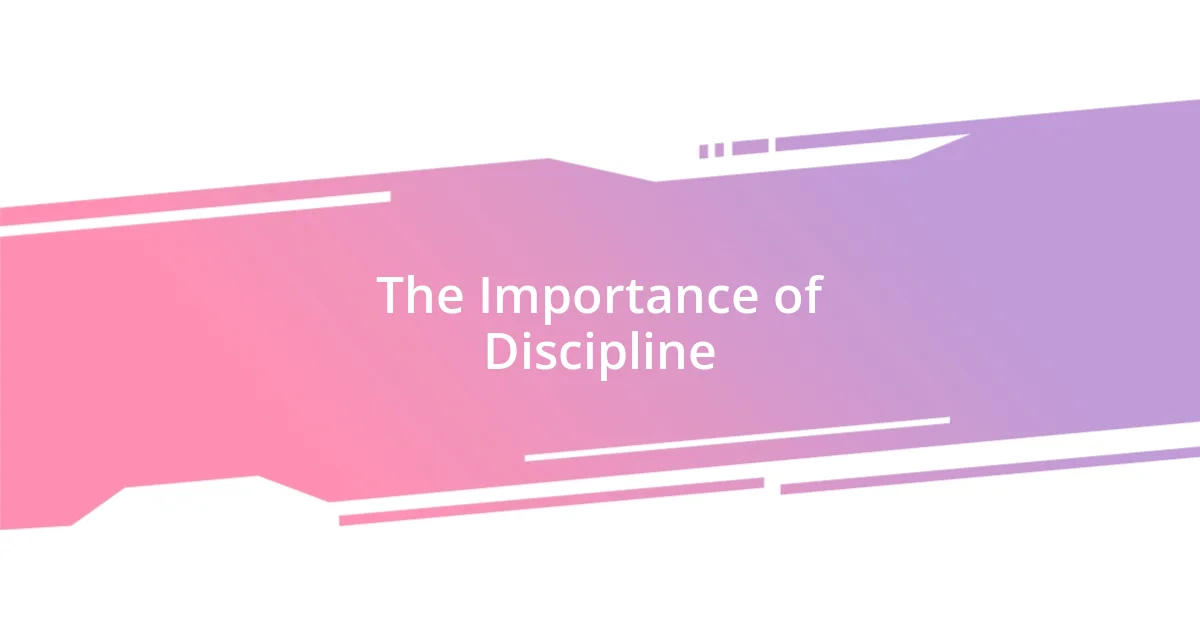Key takeaways:
- Resilience is essential, as exemplified by athletes like Serena Williams and Bethany Hamilton, who overcome significant challenges through determination and perseverance.
- Embracing criticism and continuous learning, as shown by Michael Jordan and Phil Mickelson, transforms setbacks into opportunities for growth and self-improvement.
- Discipline and teamwork are vital; athletes demonstrate how consistent practice and collaboration lead to success, inspiring us to adopt these principles in our daily lives.

Life Lessons from Sports Icons
Sports icons often teach us powerful lessons about resilience. I remember watching Serena Williams play through the pain of injuries, her determination shining in every match. Have you ever faced a setback that felt insurmountable? Her journey reminds us that persistence is a choice, even when the odds seem stacked against us.
Another profound lesson comes from Michael Jordan’s unwavering commitment to excellence. I recall a documentary where he discussed how he welcomed criticism instead of fearing it. This perspective is transformative—how often do we shy away from constructive feedback? If we embrace it like Jordan did, we can cultivate our strengths and turn weaknesses into opportunities for growth.
Lastly, humility shines through the careers of many sports legends, like the late Kobe Bryant. I was deeply moved watching him interact with young players, sharing insights and encouraging their dreams. Isn’t it inspiring to think that no matter how high you climb, lifting others can elevate us all? This humility is a poignant reminder that success is more meaningful when shared.

Overcoming Adversity in Sports
I’ve always found it remarkable how athletes navigate trials that would make many of us question our resolve. Consider the story of Bethany Hamilton, the professional surfer who, after losing her arm in a shark attack, returned to the sport she loved. Her journey wasn’t just about physical recovery; it was about a relentless spirit and an unyielding belief in herself. I remember how inspired I felt watching her compete again, realizing that true strength isn’t just about what happens on the field but how we confront life’s unexpected challenges.
Then there’s the story of Oscar Pistorius, the Paralympic sprinter who overcame the loss of both legs to become a symbol of determination. Under immense pressure, he shattered barriers and stigma, drawing attention to the capabilities of athletes with disabilities. Watching him push past societal limitations, I contemplated my own obstacles in life and how often I create my own barriers. Pistorius taught me that sometimes, the biggest limitations are the ones we impose on ourselves.
The tenacity displayed by these legends evokes powerful emotions, doesn’t it? They remind me that adversity is a universal experience, no matter the arena. Just like when I faced my own struggles trying to balance work and life, I drew strength from stories of athletes who overcame seemingly insurmountable obstacles. Their experiences taught me that resilience isn’t just a trait; it’s a practice.
| Athlete | Adversity Faced |
|---|---|
| Bethany Hamilton | Lost arm in shark attack but returned to professional surfing. |
| Oscar Pistorius | Overcame the loss of both legs to become a Paralympic champion. |

The Importance of Discipline
Discipline is a cornerstone in the lives of athletic legends, and it resonates deeply with my own experiences. I vividly remember training for a marathon; every early morning run tested my limits. I learned that discipline isn’t just about consistent practice, but also about making sacrifices—skipping social events to prioritize my training. This commitment, while challenging, brought an incredible sense of accomplishment. It taught me that real growth happens outside of our comfort zones.
- Discipline fosters resilience, enabling athletes to overcome setbacks with unwavering focus.
- It shapes their routines and mindset, leading to improved performance over time.
- The daily sacrifices made in training mirror life’s demands, teaching us to prioritize our goals.
- Legends like Serena Williams and Tom Brady demonstrate how relentless discipline can forge greatness, inspiring others to adopt the same dedication in their pursuits.
- The process of commitment builds character, reinforcing the belief that we can achieve anything when we consistently work towards it.

Building a Winning Mindset
Building a winning mindset is often about embracing challenges and shifting perspective. I recall a time when I faced a particularly tough project at work. Instead of seeing it as a burden, I shifted my thinking to view it as an opportunity to learn and grow. That mindset shift, inspired by the greats in sports who thrive under pressure, was the game-changer for me. It made me realize that the right mindset can transform any obstacle into a stepping stone toward success.
I often think about Michael Jordan, who didn’t always win but never backed down from chasing excellence. His relentless pursuit of his goals taught me that setbacks can be powerful motivators. I remember feeling emotionally connected to this idea when I struggled with my fitness journey. Each small triumph, like running an extra mile, felt monumental, mirroring the perseverance I admired in athletes. After all, what if our failures are just temporary detours on our path to success?
Additionally, visualization is a crucial strategy I learned from these legends. I used to doubt myself before big presentations, but imagining my success beforehand helped alleviate those fears. Just as athletes visualize their performances, I found that picturing myself succeeding made the actual act so much easier. Isn’t it fascinating how anticipation can reshape our reality? In my experience, embracing such techniques created a tangible shift in my confidence and approach.

Lifelong Learning from Athletes
Lifelong learning is a vital lesson we can draw from the journeys of athletes. Just like many professional sports figures, I’ve encountered moments that required me to adapt and re-evaluate my strategies. I remember a time when I struggled with balancing my career and personal development. Watching athletes like Usain Bolt adapt their techniques and continually strive for improvement inspired me to embrace change as part of my growth process. Isn’t it interesting how the most successful individuals remain students at heart, always hungry for knowledge and self-betterment?
Athletes teach us that every experience, whether a triumph or a setback, holds lessons waiting to be uncovered. I had one particularly challenging season when my goals seemed out of reach, and I felt the sting of failure. In that dark moment, I recalled pro golfer Phil Mickelson’s philosophy of seeing failure as an opportunity to learn. That shift in perspective transformed my disappointment into determination; I began to analyze what went wrong and sought ways to improve. Reflecting on this, it’s clear that our missteps can be the most powerful teachers in our lives.
Moreover, lifelong learning goes beyond just technical skills—it’s also about the emotional and mental growth that comes from experiences. I draw inspiration from legendary athletes who often face criticism and doubts. I recall a time when I hesitated to share my ideas in a group setting out of fear of rejection. But thinking about the courage displayed by athletes like Simone Biles, who openly advocates for mental health, I realized that vulnerability is a strength. Engaging in that moment of sharing became a learning experience that not only built my confidence but also encouraged others to open up. Isn’t it fascinating how the lessons from the world of sports ripple into our own lives, shaping our approach to continuous learning?

Applying Lessons in Everyday Life
It’s amazing how the lessons from athletes can infiltrate our daily routines and decision-making processes. For instance, I once tackled a daunting task of decluttering my home. Inspired by the discipline of athletes who meticulously train for their competitions, I broke the task down into manageable parts. Each small victory—a cleared shelf or a bag of donations—felt like crossing a finish line. How often do we overlook the power of incremental steps in our lives?
I also learned the importance of teamwork through sports. On a project at work, I vividly recall how my colleagues and I struggled to align our ideas. I remembered how synchronized swimming teams rely on flawless communication and trust to succeed. By fostering an open dialogue where everyone felt heard, we transformed our chaotic brainstorming sessions into a cohesive strategy. It illustrates that collaboration is key. Have you ever considered how much smoother your endeavors could be with a more team-oriented mindset?
Additionally, resilience emerges as a core lesson from athletic journeys. When my plans fell through after a promotion I was vying for slipped away, it felt like a gut punch. Reflecting on the way athletes like Serena Williams face adversity and rebound from defeats, I realized that setbacks could fuel my determination. Embracing this idea helped me push through the disappointment and focus on my next steps, transforming a moment of despair into one of growth and renewed ambition. Isn’t it liberating to think that what seems like the end might just be the beginning of a new chapter?














